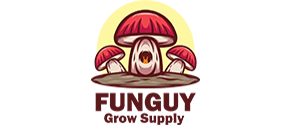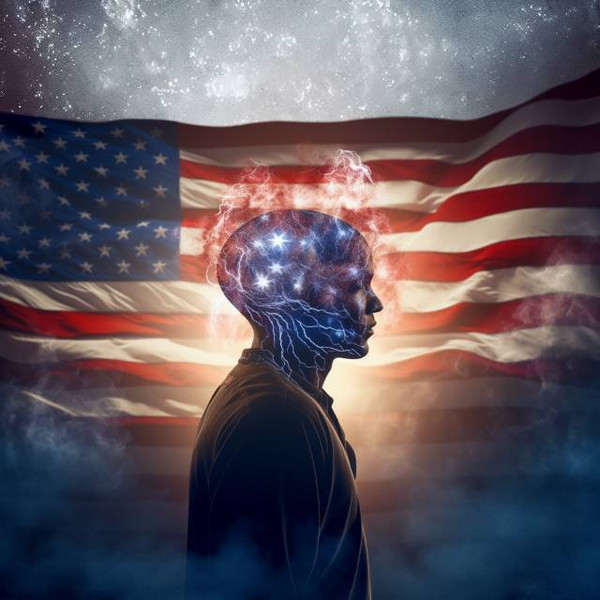Psilocybin Mushrooms And The Psychedelic Renaissance
Posted by Troy Cosky, Founder FunGuy Grow Supply on 20th Jan 2024
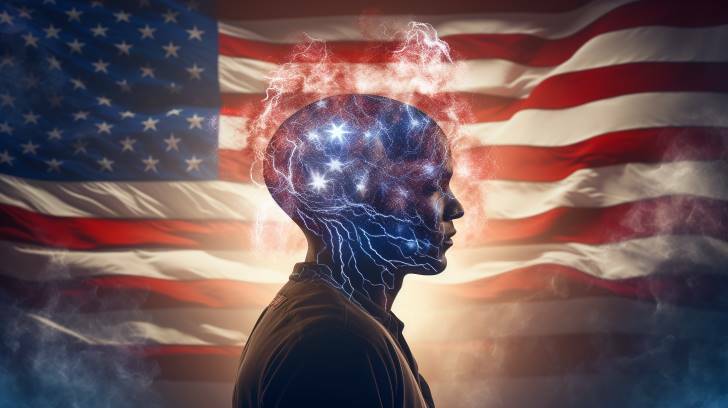
Psilocybin Mushrooms And The Psychedelic Awakening In America
Ready to dive into the world of psilocybin mushrooms and the psychedelic renaissance in America? These magical fungi, like a key to a hidden door, hold the power to unlock profound experiences and insights within your mind.
As we dig into the heart of the psychedelic renaissance in America, psilocybin mushrooms emerge as a key player in redefining therapeutic approaches to mental health. These fungi aren't mere relics of countercultural escapism; they've been culturally and historically significant, intertwined with spirituality and personal growth.
In the midst of America's psychedelic renaissance, these mushrooms are playing a pivotal role in reshaping our understanding of consciousness and mental health. By exploring the neuropharmacology and safety of psilocybin, we can begin to uncover the advantages of innovative psilocybin therapy. So, let us embark on this enlightening journey together, and unveil the hidden potential of psilocybin mushrooms.
Key Takeaways
- Psilocybin mushrooms are gaining attention for their therapeutic potential in psychedelic therapy, as they have shown efficacy in alleviating anxiety and depression.
- The legalization and regulated use of psilocybin mushrooms is gaining traction in some states, which can help minimize risks associated with unregulated consumption.
- Psilocybin therapy offers a unique approach to mental health treatment, facilitating introspection, empathy, and creativity, with long-lasting positive effects.
- Psilocybin mushrooms have cultural and historical significance, being considered sacred by indigenous communities and used in religious ceremonies for spiritual growth and enlightenment.
America's Psychedelic Renaissance
Now, let's dive into the captivating world of psilocybin mushrooms and their role in the psychedelic renaissance sweeping across America. Psilocybin mushrooms, commonly known as magic mushrooms, have recently gained significant attention for their potential therapeutic applications in the field of psychedelic therapy. As America grapples with mental health challenges, these mind-altering substances are being recognized as alternative treatments due to their unique introspective properties.

Scientific studies have shown that psilocybin mushrooms can offer individuals an opportunity to explore the depths of their psyche in ways previously unimaginable. By alleviating feelings of anxiety and depression, these mushrooms provide individuals with a newfound sense of emotional freedom. Under licensed medical supervision, psilocybin therapy has also been found to have profound spiritual benefits.
However, it is important to acknowledge the risks associated with psilocybin mushrooms. The unregulated consumption of these psychoactive substances can lead to unpredictable effects and potentially harmful experiences. That is why the legalization and regulated use of psilocybin mushrooms are gaining traction in some states across America. Advocates argue that legalization would allow for safer consumption practices, proper dosing, and professional guidance, minimizing the risks involved.
Despite the risks, the advantages of psilocybin therapy cannot be overlooked. Clinical research suggests that these mushrooms have the potential to treat a range of mental health conditions, including depression, anxiety disorders, and addiction. Moreover, they offer a unique approach to psychiatric therapy by facilitating introspection, enhancing empathy and creativity, and promoting personal growth.
As the psychedelic renaissance continues to unfold, the exploration of psilocybin mushrooms and their therapeutic potential is just beginning. With ongoing research and shifting cultural attitudes, the future of psilocybin mushroom legalization and its integration into mainstream mental health care holds great promise.
Thesis Statement
Psilocybin mushrooms have shown significant potential in providing various health benefits, particularly in the field of psychedelic therapy. Despite being classified as a controlled substance, the growing recognition of their therapeutic properties has sparked a renaissance in America, prompting a reconsideration of their legal status and paving the way for a potential revolution in mental health treatment.
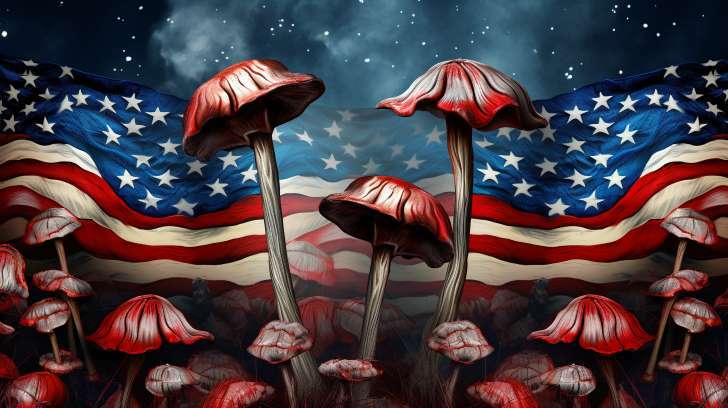
Research has demonstrated that psilocybin mushrooms can be effective in treating mental illnesses such as depression, anxiety, and addiction. Studies have shown that the psychedelic experience induced by psilocybin can help individuals gain new perspectives, enhance self-awareness, and promote personal growth. This has led to the exploration of psilocybin-assisted therapy as a potential breakthrough treatment for various mental health conditions.
In recent years, there has been a growing interest in legalizing the medical and therapeutic use of psilocybin mushrooms. Some states in America have already decriminalized or legalized the use of psilocybin mushrooms, allowing them to be used in controlled settings for therapeutic purposes. This movement towards acceptance and recognition of the therapeutic benefits of psilocybin mushrooms has fueled the psychedelic renaissance in America.
However, it is important to note that the legal status of psilocybin mushrooms varies across different jurisdictions. While some states have taken steps towards legalization, others still consider psilocybin mushrooms as illegal substances. This legal ambiguity raises questions about the accessibility and regulation of psilocybin-assisted therapy in America.
The Rich Cultural and Historical Significance of Psilocybin Mushrooms
The cultural and historical significance of psilocybin mushrooms is deeply rooted in indigenous communities worldwide, where these fungi have been utilized for centuries in spiritual practices and rituals. These mushrooms hold a special place in various cultures, symbolizing a connection between humans and the divine.

Here are five key aspects that highlight the rich cultural and historical significance of psilocybin mushrooms:
- Sacredness: Psilocybin mushrooms have long been considered sacred by indigenous communities, who believe that these fungi have the power to connect individuals with the spiritual realm. They are often used in religious ceremonies and rites of passage, serving as a tool for spiritual growth and enlightenment.
- Traditional Medicine: Psilocybin mushrooms have also been used medicinally in many indigenous cultures. They are believed to possess healing properties and have been used to treat various ailments, both physical and psychological. The mushrooms are seen as a form of traditional medicine, offering holistic healing and promoting overall well-being.
- Cultural Identity: Psilocybin mushrooms play a significant role in the cultural identity of indigenous communities. They are deeply intertwined with their beliefs, myths, and folklore, representing a shared heritage and ancestral knowledge. The use of these mushrooms strengthens cultural bonds and preserves indigenous traditions.
- Rites of Passage: Psilocybin mushrooms are often used in initiation rituals and rites of passage, marking significant milestones in an individual's life. These ceremonies help individuals transition from one stage of life to another, fostering personal growth, self-discovery, and a deeper understanding of one's place in the world.
- Connection with Nature: Psilocybin mushrooms are seen as a way to connect with the natural world and the spirits that reside within it. Indigenous cultures view these fungi as a bridge between humans and nature, promoting a sense of interconnectedness and environmental stewardship.
The cultural and historical significance of psilocybin mushrooms goes beyond their use in indigenous communities. These mushrooms have the potential to connect spirituality, personal growth, and medicinal applications, which will be explored in the next section.
How Psilocybin Mushrooms Connect Spirituality, Personal Growth, and Medicinal Applications
One key aspect of the cultural and historical significance of psilocybin mushrooms is their ability to facilitate a deep connection between spirituality, personal growth, and medicinal applications. These mushrooms have been used for centuries by indigenous communities in religious ceremonies, allowing individuals to tap into mystical experiences and gain spiritual revelations. The profound altered states induced by the powerful hallucinogenic properties of psilocybin mushrooms can lead to personal growth and a deeper understanding of oneself and the world.
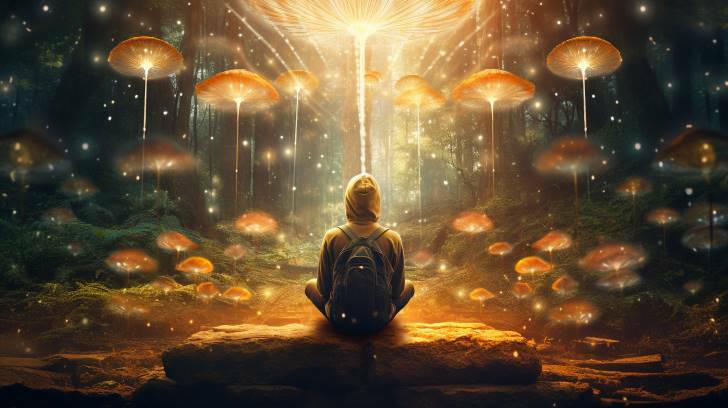
Moreover, psilocybin mushrooms are also being studied for their potential medicinal applications. Researchers are exploring their therapeutic uses in the treatment of various mental health disorders, such as depression. The ability of psilocybin to alter memory recall and induce mystical experiences suggests that it may have the potential to address underlying psychological and emotional issues.
To illustrate the connection between spirituality, personal growth, and medicinal applications of psilocybin mushrooms, here is a table that showcases the different aspects and benefits of these mushrooms:
| Aspect | Spirituality | Personal Growth | Medicinal Applications |
|---|---|---|---|
| Connection with higher powers | Facilitates communication and connection with spiritual realms | Allows for introspection and self-reflection | Potential treatment for mental health disorders |
| Attaining enlightenment | Provides access to transcendent experiences and spiritual insights | Promotes personal development and self-discovery | May alleviate symptoms of depression and anxiety |
| Insight into the deeper meaning of existence | Offers a broader perspective on life and purpose | Enhances self-awareness and understanding | Can potentially help individuals overcome trauma or addiction |
Through the exploration of spirituality, personal growth, and medicinal applications, psilocybin mushrooms offer a holistic approach to healing and self-discovery. As research continues to unfold, these mushrooms may become a valuable tool in mainstream medicine, providing individuals with new avenues for personal transformation and mental well-being.
Psilocybin Mushrooms Role in America's Psychedelic Renaissance
As psilocybin mushrooms resurface in America's psychedelic renaissance, they continue to play a pivotal role in revolutionizing the perception of traditional healing methods and expanding treatment options for mental health conditions.
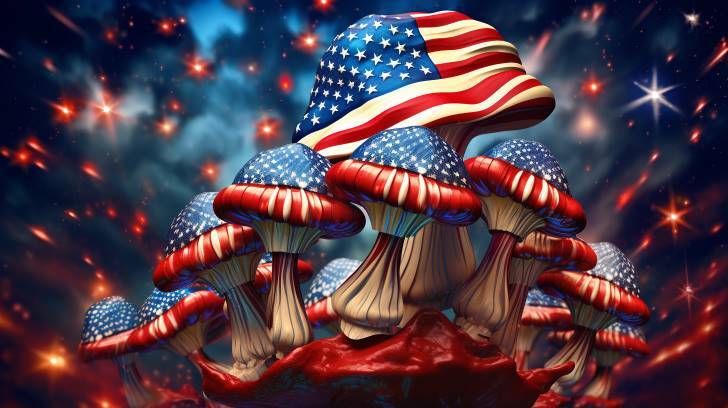
Here are five key ways in which psilocybin mushrooms are shaping America's psychedelic renaissance:
- Breaking down societal taboos: The decriminalization efforts in cities like Denver, Oakland, and Santa Cruz have helped reduce the stigma associated with psilocybin mushrooms. This shift has opened the door for increased education and research, allowing for a more informed and nuanced conversation about their potential therapeutic benefits.
- Enhancing mental health treatment: Psilocybin mushrooms have shown promising results in the treatment of mental health disorders such as depression, anxiety, and PTSD. Research suggests that their ability to induce mystical experiences can lead to profound insights, increased well-being, and long-lasting positive effects on mental health.
- Expanding perspectives on healing: The resurgence of psychedelic mushrooms challenges the conventional Western approach to healing by incorporating ancient practices that have been used for centuries by indigenous cultures. This shift encourages a more holistic view of health and well-being, recognizing the interconnectedness of mind, body, and spirit.
- Igniting scientific inquiry: The renewed interest in psilocybin mushrooms has sparked a wave of scientific research, shedding light on their therapeutic potential. Studies are now exploring their mechanisms of action, optimal dosing, and long-term effects, providing valuable data to guide future treatment protocols.
- Empowering individual agency: Psilocybin mushrooms offer individuals a unique opportunity to take an active role in their own healing journey. By facilitating introspection, self-reflection, and personal growth, they empower individuals to explore their inner landscapes and make meaningful changes in their lives.
As psilocybin mushrooms continue to gain recognition and acceptance, their benefits in the realm of mental health are becoming increasingly evident. Let's explore the specific benefits of psilocybin mushrooms and how they are transforming the field of psychedelic therapy.
Benefits of Psilocybin Mushrooms
Psilocybin mushrooms offer individuals a wide range of benefits for their mental health and personal growth journeys. Research has shown that these mushrooms can decrease levels of pessimism in the brain, leading to a more positive outlook on life. The psychedelic properties of psilocybin also enhance creative capabilities, allowing individuals to tap into their imagination and think outside the box.

Furthermore, psilocybin mushrooms can play a complementary role in providing aid to patients receiving palliative care for terminal diseases like cancer. Studies have shown that these mushrooms can help alleviate anxiety and depression in these patients, allowing them to find peace and acceptance during their end-of-life journey.
In addition to their therapeutic potential, psilocybin mushrooms have been found to have profound effects on spiritual experiences. People who have used these mushrooms report feeling a strong connection to something greater than themselves, experiencing a sense of unity and interconnectedness with the universe. This can lead to a deeper understanding of oneself and the world around them, and can even spark a sense of purpose and meaning in life.
The decriminalization of psilocybin mushrooms in certain parts of the world have allowed for further research into their potential benefits. Studies on microdosing therapy have shown promising results in treating depression and anxiety. Microdosing involves taking sub-perceptual doses of psilocybin, which can improve mood, increase focus, and enhance creativity without inducing a full psychedelic experience.
Psilocybin Mushrooms in Psychedelic Therapy and Holistic Approaches
The therapeutic potential of psilocybin mushrooms extends to psychedelic therapy and holistic approaches, providing individuals with transformative experiences to explore their psyche and promote overall well-being. These mushrooms offer a unique opportunity for individuals to delve into the depths of their consciousness and gain profound insights that can lead to personal growth and healing.

Here are five key ways in which psilocybin mushrooms are being utilized in psychedelic therapy and holistic healing approaches:
- Trauma Healing: Psilocybin mushrooms have shown promise in helping individuals heal from trauma by allowing them to revisit and reprocess painful memories in a safe and supportive environment. This can lead to a reduction in symptoms of post-traumatic stress disorder (PTSD) and an overall improvement in psychological well-being.
- Addiction Treatment: Psychedelic therapy involving psilocybin mushrooms has demonstrated potential in treating substance addiction by helping individuals confront and address the underlying emotional and psychological issues that contribute to their addictive behaviors. This approach has shown promising results in reducing cravings and promoting long-term recovery.
- Anxiety and Depression Relief: Psilocybin mushrooms have been shown to alleviate symptoms of anxiety and depression by promoting a sense of interconnectedness and creating a shift in perspective. These experiences can lead to increased feelings of positivity, self-acceptance, and a greater sense of purpose in life.
- Spiritual Exploration: Psilocybin mushrooms have been used for centuries in spiritual and ceremonial practices for their ability to induce profound mystical experiences. In a therapeutic setting, these experiences can facilitate spiritual exploration, leading to a greater sense of connection with oneself, others, and the universe as a whole.
- Mindfulness and Self-Awareness: Psilocybin mushrooms can enhance mindfulness and self-awareness, allowing individuals to gain a deeper understanding of their thoughts, emotions, and behaviors. This increased self-awareness can lead to personal growth, improved decision-making, and a greater sense of overall well-being.
Exploring the Risks and Hurdles of Psilocybin Mushrooms Usage
When exploring the risks and hurdles of using psilocybin mushrooms, it is important to consider the potential challenges that individuals may face in terms of legal and regulatory barriers. Despite the growing acceptance and recognition of the therapeutic potential of psilocybin mushrooms, there are still significant obstacles to their integration into mainstream medical practices. Lawmakers and skeptics often raise objections and impose strict regulations, making it difficult for these substances to be studied and prescribed as medicine. This creates an uphill battle for psychedelic researchers and healthcare professionals who are advocating for the exploration of psilocybin's therapeutic benefits.

Furthermore, psilocybin mushrooms face social stigmatization, leading to misunderstandings and biases that can negatively impact users. The general public may hold misconceptions about the nature of these substances, hindering meaningful dialogue and progress in healthcare. Cultural divides and stereotyping further compound the challenges, making it harder for the potential benefits of psilocybin mushrooms to be recognized and accepted.
Despite these hurdles, it is important to acknowledge the experiences of individuals who have found positive results from psilocybin therapy. Their stories provide hope and inspiration for the future of alternative treatments. By promoting holistic approaches and drug-free initiatives, these therapies challenge traditional views and pave the way for new advancements in psychosocial healthcare.
Psilocybin's Role in Creativity, Artistic Expression, and Intellectual Exploration
When it comes to creativity, artistic expression, and intellectual exploration, psilocybin has shown promising potential. Users often report heightened levels of creativity and problem-solving abilities when under the influence of psilocybin, leading to new insights and perspectives. However, the research in this area faces significant challenges due to legal restrictions, making it difficult to fully explore and understand the extent of psilocybin's role in these domains.

Benefits of Psilocybin for Creativity, Artistic Expression, and Intellectual Exploration
Using psilocybin mushrooms can enhance your creativity, artistic expression, and intellectual exploration. The benefits of psilocybin for these aspects of human experience are well-documented and widely recognized. Here are five ways in which psilocybin can positively impact your creative and intellectual pursuits:
- Heightened levels of creativity: Psilocybin has been shown to increase divergent thinking and promote the generation of novel ideas, leading to greater creative output.
- Improved problem-solving abilities: The psychedelic experience can help break down mental barriers and foster a more open-minded approach to problem-solving, allowing for innovative solutions.
- Access to latent aspects of personality: Psilocybin can facilitate introspection and self-reflection, enabling individuals to tap into hidden aspects of their personality and explore new perspectives.
- Inspiration for artistic expression: Many artists have reported that psilocybin experiences provide them with profound inspiration and a deeper connection to their creative process.
- Introspective journeys unlocking newfound insights: By exploring the depths of one's mind under the influence of psilocybin, individuals can gain valuable insights and make connections that may have previously eluded them.
Challenges of Researching Psilocybin
Exploring the transformative potential of psilocybin mushrooms in creativity, artistic expression, and intellectual exploration presents researchers with various challenges. One of the primary obstacles is the regulatory restrictions on the use of psychedelics for non-therapeutic purposes. These restrictions limit the availability of psilocybin for research and make it difficult for scientists to conduct comprehensive studies. Additionally, the subjective nature of creativity and artistic expression poses a challenge in measuring and quantifying the effects of psilocybin on these domains. Unlike more objective measures, such as physiological changes or cognitive performance, creativity and artistic expression are highly individual and difficult to assess objectively. Furthermore, the long-lasting effects of psilocybin can make it challenging to design studies that capture the full extent of its impact on creativity and intellectual exploration. Despite these challenges, researchers are making strides in understanding the role of psilocybin in these areas, contributing to the emerging field of psychedelic research.
Psilocybin Mushroom Legalization and Therapeutic Use in America
You often hear about the ongoing discussions surrounding the legalization and therapeutic use of psilocybin mushrooms in America. The current landscape regarding this topic is complex, with various factors influencing the progress towards legalization and the exploration of their therapeutic potential.
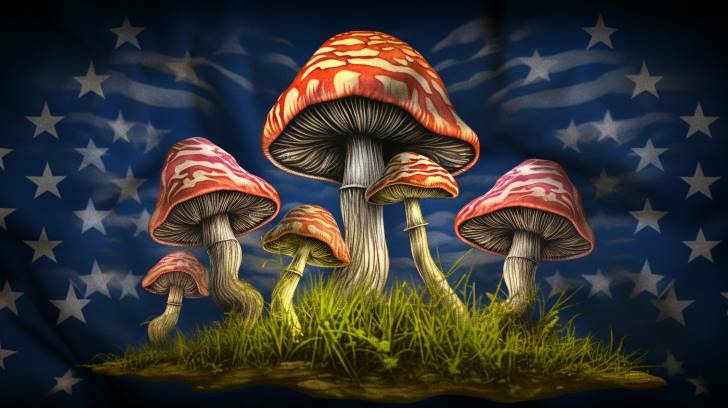
Here are five key points to consider:
- Decriminalization efforts: Several cities in the United States have taken progressive measures towards decriminalizing psilocybin-containing mushrooms. By reducing penalties for possession and usage, these cities are paving the way for a more compassionate approach to individuals who may benefit from these substances.
- Growing movement for legalization: Alongside decriminalization, there is a growing movement advocating for the complete legalization of recreational use. This movement is fueled by evidence from liberal policy reform trials, which have shown promising progress on a global scale.
- Potential therapeutic benefits: Despite the current legal restrictions, there is a growing interest in exploring the therapeutic benefits of psilocybin-containing mushrooms. These compounds have shown promise in complementing traditional treatment options for mental health conditions such as depression and anxiety.
- Regulatory challenges: Regulatory agencies face significant challenges in effectively assessing and managing the risks associated with psilocybin mushrooms. The scarcity of comprehensive data and the constant evolution of these substances make it difficult to establish informed policies.
- Call for regulatory review: Many researchers and advocates are calling for a scheduled review of existing regulations to pave the way for the exploration of therapeutic potential and the identification of suitable treatment channels worldwide. This review would help bridge the gap between science-based medicinal practices and the potential benefits of psilocybin mushrooms.
Innovative Psilocybin Therapy for Enhanced Post-Treatment Care
After undergoing psilocybin therapy, individuals can experience enhanced post-treatment care through the integration of innovative techniques that combine the profound effects of psychedelic experiences with other forms of therapy. The integration of psilocybin with mindfulness meditation or cognitive-behavioral talk therapies has shown immense promise in the field of mental health. These combined approaches provide a holistic and comprehensive treatment that equips patients with the necessary tools to effectively manage stressors beyond their therapy sessions.

By incorporating mindfulness meditation, individuals develop heightened self-awareness and learn to cultivate a sense of present moment awareness. This practice enables patients to recognize and regulate their emotions more effectively, leading to increased emotional stability and resilience. Additionally, cognitive-behavioral talk therapies help patients identify and challenge negative thought patterns, replacing them with healthier and more adaptive beliefs and behaviors. This combination of techniques promotes long-term effectiveness, allowing individuals to navigate personal transitions and challenges with confidence.
Furthermore, personalized therapy programs using this innovative approach have been designed to address a wide range of psychological issues, including anxiety disorders, depression, and bipolar disorders. Instead of merely focusing on symptom reduction, these programs aim to empower individuals with interpersonal skills through transformative outburst sessions and group psychotherapy. By restoring mental stability, individuals are better equipped to handle the post-transition phase and develop positive behavioral patterns.
The Advantages of Innovative Psilocybin Therapy
When it comes to innovative psilocybin therapy, there are several advantages worth discussing. Firstly, this therapy can enhance post-treatment care by promoting self-awareness and providing individuals with tools to build coping skills and resilience. Additionally, this therapy can target a broad range of psychological issues and help individuals navigate post-transition behavioral patterns. By ensuring safety and regulation, innovative psilocybin therapy has the potential to transform traditional healthcare models through integrated approaches.
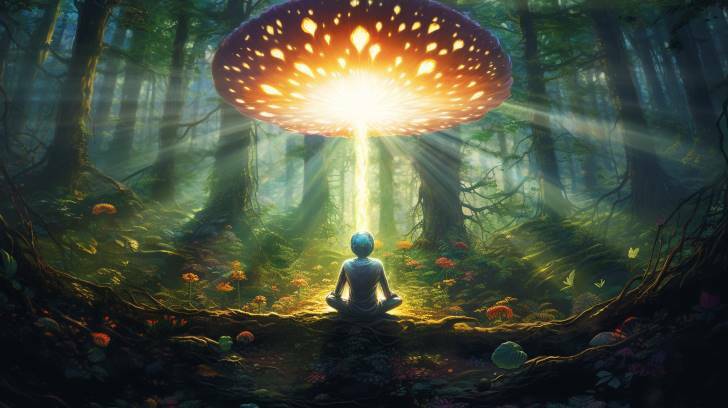
Enhanced Post-Treatment Care and Self-Awareness
Improved post-treatment care and self-awareness are key advantages of innovative psilocybin therapy, providing comprehensive support for optimal recovery. After undergoing psilocybin therapy, patients are not left to navigate the complexities of their healing journey alone. Instead, they are provided with enhanced post-treatment care that includes regular follow-up sessions, integration therapy, and ongoing support from trained professionals. This ensures that patients have a safe space to process their experiences, address any lingering concerns, and continue their personal growth.
In addition to post-treatment care, innovative psilocybin therapy places a strong emphasis on self-awareness. By using psilocybin as a catalyst, individuals are able to explore their inner selves, gaining deep insights into their emotional and psychological patterns. This increased self-awareness allows patients to make meaningful changes in their lives, break free from destructive habits, and develop healthier coping mechanisms. It also empowers them to take ownership of their mental health and make more informed decisions about their well-being.
Psilocybin Therapy Features:
- Psilocybin therapy sessions conducted in a controlled and supportive environment
- Integration therapy and ongoing support from trained professionals
- Safe and carefully managed administration of psilocybin
Pros:
- Comprehensive support for optimal recovery
- Regular follow-up sessions to address any concerns
- Increased self-awareness and personal growth
- Breakthrough insights and potential for lasting positive change
Cons:
- Potential for challenging and intense experiences during therapy
- The therapy may not be suitable for individuals with certain mental health conditions or medical contraindications
- Limited availability and accessibility of psilocybin therapy in some regions.
Building Coping Skills and Resilience
During innovative psilocybin therapy, you can actively build coping skills and resilience through the exploration of your inner self and the support of trained professionals. This therapeutic approach offers a unique opportunity to develop effective techniques for managing stressors and handling challenges. By delving into your inner world, you can gain a deeper understanding of your emotions, thoughts, and patterns of behavior. Trained professionals provide guidance and support throughout the process, helping you navigate the complexities of your inner landscape. As you build coping skills and resilience, you become better equipped to face the ups and downs of life.

Here are five advantages of innovative psilocybin therapy in building coping skills and resilience:
- Increased self-awareness and understanding
- Enhanced emotional regulation
- Improved problem-solving and decision-making abilities
- Strengthened interpersonal relationships
- Greater adaptability to change
Through this transformative therapy, you can cultivate the tools necessary to navigate life's challenges with strength and resilience.
Targeting a Broad Range of Psychological Issues and Post-Transition Behavioral Patterns
As you explore the advantages of innovative psilocybin therapy in building coping skills and resilience, you will discover its effectiveness in targeting a broad range of psychological issues and post-transition behavioral patterns. This therapy has shown promising results in addressing mental health concerns such as anxiety, depression, addiction, and post-traumatic stress disorder (PTSD). By working with the psilocybin compound, individuals gain a unique opportunity to gain deeper insights into their thoughts, emotions, and behaviors. This heightened self-awareness allows for a more comprehensive understanding of the underlying causes of their psychological struggles and post-transition behavioral patterns. As a result, they are better equipped to address and overcome these challenges, leading to positive shifts in their overall psychological well-being. The versatility of psilocybin therapy in targeting a wide range of psychological issues makes it a valuable tool in the field of mental health.
Ensuring Safety and Regulation
To ensure the safe and responsible use of psilocybin therapy, strict drug safety protocols and licensing regulations must be in place. These measures are essential to mitigate potential risks and ensure the well-being of patients.

Here are five advantages of implementing rigorous safety and regulation practices in the field of innovative psilocybin therapy:
- Enhanced patient safety, drug use, mental state, and risk management
- Standardization of treatment protocols for consistent outcomes
- Training and certification programs for healthcare professionals to ensure competence
- Quality control measures to ensure the purity and potency of psilocybin products
- Ethical guidelines to protect the rights and dignity of patients
Transforming Traditional Healthcare Models through Integrated Approaches
Transforming traditional healthcare models can be achieved by integrating innovative psilocybin therapy, offering numerous advantages for mental health and well-being. By incorporating this groundbreaking approach, traditional healthcare models can be expanded to include the profound potential of psilocybin mushrooms. The integration of psilocybin therapy into existing treatment approaches has the power to revolutionize the field of psychotherapy. This integrated approach combines cutting-edge research with progressive attitudes towards psychedelics, paving the way for newer psychological practices to improve mental wellness on a global scale. By embracing the psychosocial developmental opportunities offered by psilocybin therapy, traditional healthcare models can transcend their limitations and provide more comprehensive and effective care for patients. This transformation in healthcare models holds the promise of shaping the collective destiny of humanity and opening up breathtaking possibilities for the future of mental healthcare.
Exploring the Neuropharmacology and Safety of Psilocybin
As you explore the neuropharmacology and safety of psilocybin, it is important to consider the neuropharmacological mechanisms beyond serotonin receptors. While psilocin's binding to 5-HT2A receptors is well-documented, researchers are still working to understand how this interaction leads to the profound changes in perception and consciousness that occur with psychedelic use. By delving further into the underlying neurochemical processes, we can gain a deeper understanding of the effects and potential therapeutic applications of psilocybin.
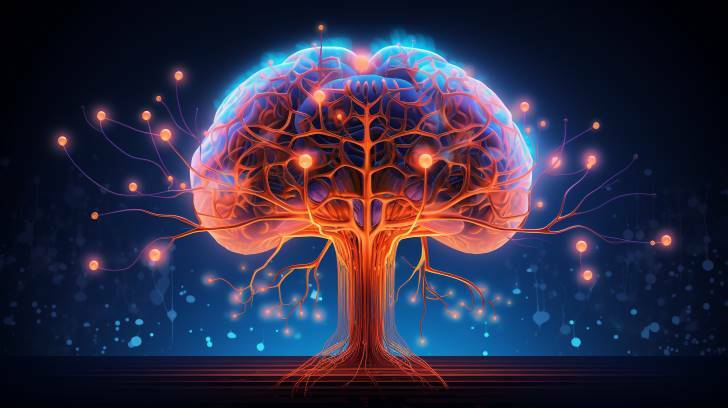
Neuropharmacological Mechanisms Beyond Serotonin Receptors
Explore the neuropharmacological mechanisms beyond serotonin receptors to gain a deeper understanding of the neuropharmacology and safety of psilocybin. While psilocybin is known to bind at 5-HT2A sites in specific areas of the brain, research suggests that its effects extend beyond this interaction. Here are five neuropharmacological mechanisms that contribute to the actions of psilocybin:
- Partial receptor agonism: Psilocybin's efficacy is mediated through partial receptor agonism, which means it activates the receptors to a certain extent without fully activating them.
- Dopamine modulation: Psilocybin may modulate dopamine levels in the brain, potentially influencing mood and motivation.
- Histamine-related signaling pathways: Psilocybin may interact with histamine-related signaling pathways, which play a role in various physiological processes.
- Neurotransmitter system readjustment: Psilocybin may readjust levels across different neurotransmitter systems, leading to its diverse effects on cognition and perception.
- Acute actions: Psilocybin's acute actions are a result of its interactions with multiple neuropharmacological mechanisms, contributing to its psychedelic properties.
Understanding these mechanisms is crucial for evaluating the neuropharmacology and safety of psilocybin. Further research is needed to fully elucidate the complex actions of this compound.
The Safety of Psilocybin
Psilocybin's safety profile makes it an attractive option for individuals interested in exploring psychedelic experiences. Unlike many drugs of abuse, psilocybin is considered safe for ingestion despite its hallucinogenic properties. Research has shown that the psychedelic substance does not produce significant adverse physiological or psychological outcomes compared to other substances. While some side effects have been observed among regular users over time, they are seen in fewer individuals.
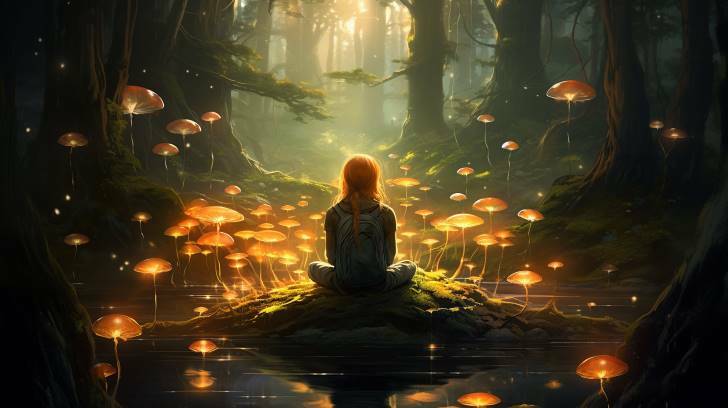
One reason for psilocybin's safety is its lack of toxicity. Studies have demonstrated that psilocybin does not cause organ damage or toxicity, even when taken in high doses. This is in stark contrast to other substances that can have harmful effects on the liver, kidneys, and other vital organs. Additionally, psilocybin has a low potential for addiction and abuse. Unlike many drugs of abuse that can lead to physical dependence and withdrawal symptoms, psilocybin does not produce these effects.
Furthermore, psilocybin has been found to have a low risk of overdose. The dose required to induce a psychedelic experience is much lower than the toxic dose, making it difficult to overdose on psilocybin alone. However, it is worth noting that combining psilocybin with other substances, such as alcohol or stimulants, can increase the risk of adverse reactions and should be avoided.
Although psilocybin is generally safe, it is not without potential risks. Some individuals may experience psychological distress or panic reactions while under the influence of psilocybin. These effects are typically short-lived and can be mitigated by having a trusted guide or therapist present during the experience. Additionally, individuals with a history of mental health issues or certain medical conditions should exercise caution and consult with a healthcare professional before using psilocybin.
Final Thoughts
In conclusion, psilocybin mushrooms' unique properties make them a promising alternative treatment for mental health conditions like depression and anxiety disorders. Despite experiencing setbacks like criminalization, academic interest in psychedelics has surged in recent years, leading to the Psychedelic Renaissance in America. The resurgence of interest in psychedelic therapy presents significant promise for better psychosocial development within societies.
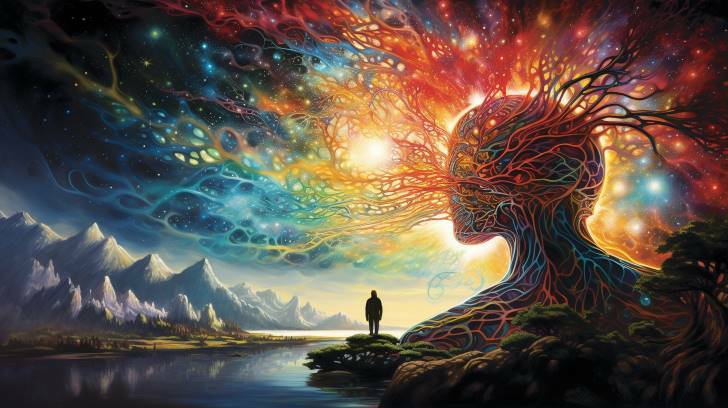
Expanding society's perspective on traditional healing methods harnessed from ancient communities globally using natural substances available throughout the globe could lead to a revolution in treatment options present within western forms of medical science. Legal exemptions already granted to some religious groups indicate psychedelic substances' increasing acceptance into mainstream society. Regulatory authorities should reconsider listing psychedelics as controlled substances to allow for better psychosocial development within societies. As the interest in psychedelic therapy continues to grow, legalizing under lab supervision could potentially offer spiritual optimization and improved psychosocial enhancement within communities worldwide.
Premium Mushroom Cultivation Supplies
Looking to enhance your mushroom cultivation? Visit FunGuy Mushroom Supply for top-tier grow kits, grain spawn, and substrates. Whether you're starting out or scaling up, our range of products supports every step of your journey. Shop today for your cultivation success!
Frequently Asked Questions
Are There Any Known Risks or Potential Negative Side Effects of Using Psilocybin Mushrooms?
Well, let's dive into the realm of possibilities. Like any powerful substance, psilocybin mushrooms can have their share of risks. They can cause hallucinations, psychedelic effects, intense emotions, and altered perception of reality. In some cases, individuals may experience anxiety, paranoia, or even a bad trip. It's important to approach these mushrooms with caution and in a safe environment, as the effects can vary greatly from person to person.
How Does Psilocybin Therapy Work, and What Are Its Potential Benefits for Mental Health?
Psilocybin psychiatry therapy works by utilizing the psychoactive compound found in psilocybin mushrooms to promote introspection, emotional breakthroughs, and a heightened sense of self-awareness. Through carefully guided sessions, therapists help individuals navigate their inner thoughts, feelings, and experiences, allowing them to explore and address deeply rooted psychological issues. The potential benefits for mental health include alleviating symptoms of depression, anxiety, and post-traumatic stress disorder, as well as promoting personal growth, improved well-being, and a greater sense of meaning and purpose in life.
What Is the Current Legal Status of Psilocybin Mushrooms in the United States?
Psilocybin mushrooms in the United States, what's the deal? Well, let me break it down for you. Currently, the legal status of these mushrooms varies from state to state. Some states have decriminalized them, treating possession as a low priority offense. But, be careful, because in most states, psilocybin mushrooms are still illegal. The federal government also classifies them as a Schedule I substance, which means they are considered to have a high potential for abuse and no recognized medical value. So, tread lightly if you're thinking about getting your hands on some.
Can Psilocybin Mushrooms Be Used as a Substitute for Traditional Forms of Therapy or Medication?
The potential therapeutic benefits of psilocybin mushrooms have garnered significant attention in recent years. Studies and clinical trials suggest that psilocybin, the active compound in these mushrooms, may have profound effects on mental health conditions such as depression, anxiety, and addiction. While more research is needed to fully understand their therapeutic value, some psychedelic users have reported positive experiences using psilocybin mushrooms in conjunction with therapy. However, it is important to note that their use should always be approached with caution and under the guidance of a healthcare professional.
How Does Psilocybin Affect the Brain and What Are the Potential Long-Term Effects of Use?
Psilocybin, the active compound in magic mushrooms, has a profound effect on the brain. When ingested, it binds to certain receptors, leading to alterations in perception, mood, and cognition. These subjective effects can be both short-term and long-term. In the short-term, psilocybin can induce a variety of experiences, from euphoria to hallucinations and altered states of consciousness. However, the long-term effects are less understood. Some studies suggest that psilocybin may have potential therapeutic benefits, but more research is needed to fully understand its long-term effects on the brain.
Curious to learn more about the fascinating world of psilocybin mushrooms and the psychedelic renaissance in America? Check out these authoritative sources for reliable information and updates:
- Johns Hopkins University Center for Psychedelic and Consciousness Research: Visit their website for in-depth information and updates on the latest findings in the field.
- Multidisciplinary Association for Psychedelic Studies (MAPS): Explore their website for a wealth of information, including the latest research, news, and resources related to psychedelics, including psilocybin.
- National Institute of Mental Health (NIMH): Visit their website for reliable information on the current state of research and the potential therapeutic applications of psilocybin mushrooms in the context of mental health treatment.
Note: It's always important to rely on reputable sources for accurate and up-to-date information on this topic. Stay informed and consult with qualified professionals for any questions or concerns related to psilocybin mushrooms or psychedelic use.
The references provided contain scientific studies exploring the safety and efficacy of psilocybin mushrooms in treating mental health disorders, as well as their historical significance. They serve as sources for readers to gain a deeper understanding of the potential applications of psychedelic compounds towards therapeutic advancements globally.
References
- Lieberman, J. A., & Dunbar, K. (2019). The Roots of Mental Illness: How Much of Mental Illness Is Biological and How Much Is Due to Environmental Factors?. Scientific American Mind, 30(4), 20-27. https://www.apa.org/monitor/2012/06/roots
- Griffiths, R. R., Johnson, M. W., Carducci, M. A., Umbricht, A., Richards, W. A., Richards, B. D., & Klinedinst, M. A. (2016). Psilocybin produces substantial and sustained decreases in depression and anxiety in patients with life-threatening cancer: A randomized double-blind trial. Journal of psychopharmacology, 30(12), 1181-1197. https://journals.sagepub.com/doi/10.1177/0269881116675513
- Carhart-Harris, R. L., & Goodwin, G. M. (2017). The therapeutic potential of psychedelic drugs: past, present, and future. Neuropsychopharmacology, 42(11), 2105-2113. https://doi.org/10.1038/npp.2017.84
- Garcia-Romeu, A., Kersgaard, B., & Addy, P. H. (2016). Clinical applications of hallucinogens: A review. Experimental and Clinical Psychopharmacology, 24(4), 229–268. https://doi.org/10.1037/pha0000084
- Stamets, P. (1996). Psilocybin mushrooms of the world: an identification guide. Ten Speed Press.
- McKenna, T. (1992). Food of the gods: the search for the original tree of knowledge : a radical history of plants, drugs, and human evolution. Bantam Books.
- Johnson, M. W., Richards, W. A., & Griffiths, R. R. (2008). Human hallucinogen research: guidelines for safety. Journal of Psychopharmacology, 22(6), 603-620. https://doi.org/10.1177/0269881108093587
- Grof, S. (1980). LSD psychotherapy. Hunter House.
- Nutt, D. J., King, L. A., & Phillips, L. D. (2010). Drug harms in the UK: a multicriteria decision analysis. The Lancet, 376(9752), 1558-1565. https://doi.org/10.1016/S0140-6736(10)61462-6
- Passie, T., Seifert, J., Schneider, U., & Emrich, H. M. (2002). The pharmacology of psilocybin. Addiction Biology, 7(4), 357-364. https://doi.org/10.1080/1355621021000005937
- Hendricks, P. S., Thorne, C. B., Clark, C. B., Coombs, D. W., & Johnson, M. W. (2015). Classic psychedelic use is associated with reduced psychological distress and suicidality in the United States adult population. Journal of Psychopharmacology, 29(3), 280-288. https://doi.org/10.1177/0269881114565653
*This article is meant for educational and harm reduction purposes only. FunGuy Grow Supply strongly opposes the manufacturing of any illicit substance, including psilocybin. FunGuy Grow Supply's products are intended to be used only for lawful purposes. Please be advised that the information provided in this article is not intended to facilitate or encourage the production of any illegal substance.
